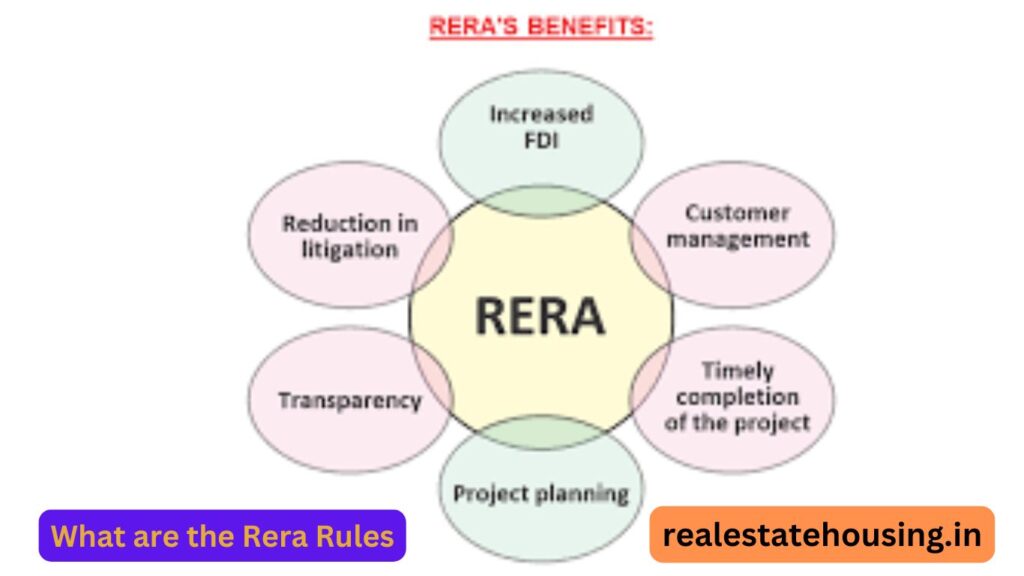What are the Rera Rules? What Are RERA Rules? Understanding the Real Estate (Regulation and Development) Act

The Real Estate (Regulation and Development) Act, 2016 (RERA) was enacted to protect homebuyers and ensure transparency, accountability, and efficiency in the real estate sector in India.
Since its implementation, RERA has brought significant changes to how real estate projects are regulated, aiming to improve trust between buyers and developers. In this article, we’ll explore what RERA rules are, their objectives, and how they impact the real estate industry.
What Is TNC RERA
The Real Estate (Regulation and Development) Act, 2016, was passed by the Indian Parliament to regulate the real estate sector and ensure that developers adhere to certain standards, thereby protecting homebuyers from unfair practices.
The primary aim of RERA is to create a transparent and trustworthy real estate environment by enforcing strict guidelines for project registration, timely delivery, and protection of homebuyers’ interests.
Objectives of RERA:
Transparency: Ensures that developers provide clear and accurate information to buyers regarding project details, approvals, and other essential information.
Accountability: Establishes accountability for developers, ensuring that they comply with project timelines, quality standards, and financial obligations.
Efficiency and Timely Deliveries: Ensures timely completion of real estate projects and discourages delays, which were a common issue before RERA.
Protection of Homebuyers’ Interests: Provides a platform for resolving disputes between buyers and developers efficiently
Key Features of RERA Rules
The RERA rules apply to residential as well as commercial real estate projects, covering developers, real estate agents, and homebuyers. Here are some key features of RERA:
a. Project Registration
One of the fundamental aspects of RERA is that all real estate projects of a certain size must be registered with the respective State RERA Authority before launching. A project is required to be registered if it is:
A residential project with more than 8 units.
A commercial project of any size.
Failure to register can result in legal penalties, including stopping the sale of unregistered projects.
b. Mandatory Disclosure
Developers are required to provide detailed information about the project, including:

Project layout, land details, and approvals.
Timelines for completion.
Details about the builder, including financials and past track record.
Pricing, amenities, and all legal aspects such as approvals from local authorities.
C. Escrow Account & Use of Funds
RERA mandates that developers must maintain an escrow account, into which a significant portion of the collected funds from homebuyers will be deposited. This ensures that the funds collected for a project are used exclusively for that project and not diverted elsewhere. The money can only be used for construction-related expenses, ensuring that the project progresses without financial interruption.
D. Commitment to Delivery Timeline
One of the key areas addressed by RERA is the commitment to completing projects on time. Developers are now required to complete and deliver projects within the stipulated timeframe mentioned at the time of project registration. Failure to meet these deadlines makes them liable to pay penalties or interest to buyers, ensuring a greater sense of accountability.
e. Penalty for Delays and Defaults
Under RERA, developers who fail to meet project completion timelines must pay interest or compensation to buyers. The act also outlines penalties for non-compliance, including the possibility of imprisonment for developers in cases of fraud or violations of RERA rules.
f. Real Estate Regulatory Authority (RERA)
Every state has set up a Real Estate Regulatory Authority (RERA) to oversee and enforce the provisions of the Act. The authority’s role includes:
Regulating and maintaining project registrations.
Monitoring financial transactions and escrow accounts.
Resolving disputes between buyers and developers.
Promoting transparency and accountability in the sector.
g. Consumer Protection & Dispute Redressal
RERA introduces an effective grievance redressal mechanism for homebuyers. If there is a dispute between buyers and developers regarding project delays, payments, or quality, the affected party can file a complaint with the RERA Authority. These complaints are addressed within a stipulated timeframe, providing quicker resolution than before.
- Impact of RERA Rules on the Real Estate Sector
Since the introduction of RERA, the real estate sector has witnessed notable positive changes:
a. Increased Buyer Confidence
RERA has restored trust among homebuyers. Knowing that developers are legally bound to provide information, deliver projects on time, and use funds transparently has led to increased confidence among buyers.
b. Reduced Fraud and Misrepresentation
With stringent disclosure requirements, the incidence of fraudulent and misleading practices has decreased. Homebuyers now have access to crucial project-related information, ensuring transparency at every stage.
c. Timely Project Completion
By holding developers accountable for timely project delivery, RERA has reduced the number of delayed projects, which was a significant concern for buyers in the past.
d. Enhanced Real Estate Practices
Developers are now compelled to focus more on quality construction, proper planning, and adhering to regulatory norms. This has resulted in the improvement of overall real estate practices and the rise of better housing projects.
- RERA Compliance for Homebuyers and Developers
For homebuyers, RERA provides a legal framework to seek compensation or refunds in case of delays or disputes, ensuring they are not left at a disadvantage.
For developers, adhering to RERA rules is mandatory for project registration, and they are expected to maintain transparency, ensure timely completion, and remain accountable for any non-compliance.

Conclusion
More Article – What is TNC Divertion
RERA has transformed India’s real estate landscape, bringing in much-needed accountability, transparency, and efficiency. The act ensures that both developers and homebuyers have defined rights and responsibilities, fostering trust and confidence in the real estate sector. For homebuyers, RERA provides a strong foundation to ensure their investments are protected, while for developers, it ensures a streamlined and regulated operational environment. Understanding and complying with RERA rules is essential for anyone involved in the real estate industry, contributing to a more robust and trustworthy real estate ecosystem in India.

